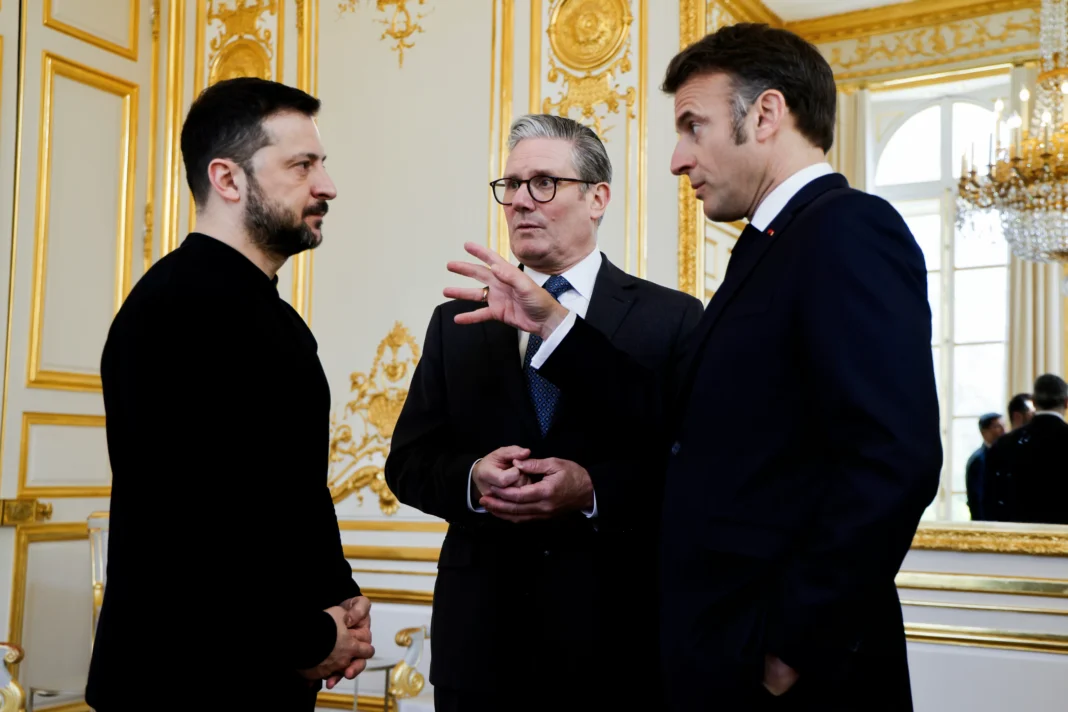Ukraine’s President Volodymyr Zelenskyy, French President Emmanuel Macron, and Britain’s Prime Minister Keir Starmer came together in Paris on Thursday to send a strong message to Russian President Vladimir Putin. The trio, along with a coalition of around 30 nations, firmly rejected Putin’s demand for lifting sanctions in exchange for a peace deal in Ukraine.
The meeting, known as the “coalition of the willing”, was called by Starmer in response to the recent US-brokered peace deal between Russia and Ukraine. While the White House has said it will consider Putin’s proposal, European leaders have flat-out rejected it and instead suggested increasing sanctions against Russia.
Speaking alongside Zelenskyy, who has been advocating for stricter sanctions, Starmer accused Putin of “playing games” and “filibustering”. He emphasized that now is not the time to lift sanctions, but rather to increase them in order to support the US initiative and put more pressure on Russia.
Macron echoed this sentiment, stating that the coalition “unanimously” agreed that sanctions should not be lifted until “peace has clearly been established”. German Chancellor Olaf Scholz also shared the same view, calling it a “serious mistake” to end sanctions before a lasting peace is achieved.
The US announced this week that both Russia and Ukraine had agreed to end fighting in the Black Sea. However, Moscow later stated that it would only implement the deal if some sanctions imposed on Russian banks and exports are lifted. This sparked a response from US Secretary of State Marco Rubio, who said they will be “evaluating” Russia’s terms.
This sudden shift in stance from the US is a U-turn from just three weeks ago when President Trump used the threat of further sanctions to pressure Russia into negotiations. Starmer, sensing the urgency of the situation, set up the “coalition of the willing” to ensure a united front against Putin’s demands.
During the press conference, Starmer stated that the coalition now has a “consensus” which is “stronger and broader than it’s ever been”. He also revealed that military chiefs from the UK, France, and Germany will be meeting with their counterparts from other nations to discuss the possibility of deploying British troops in Ukraine to deter further Russian aggression in the event of a peace deal.
However, Starmer emphasized that this would require the support and engagement of the United States. He also dismissed Russia’s warnings against triggering a direct conflict with NATO, stating that it is clear that Russia wants a “defenceless” Ukraine and their position cannot guide the response of the coalition.
This meeting in Paris sends a clear message to Putin that the international community stands united against his aggressive tactics and will not back down. It also highlights the importance of maintaining strong sanctions against Russia until a lasting peace is achieved in Ukraine. The coalition of nations, led by Starmer, has shown great determination and solidarity in the face of Putin’s attempts to divide and weaken them.
In conclusion, the actions of Zelenskyy, Macron, and Starmer, along with their European allies, have firmly rejected Putin’s demands and sent a strong message to the US to stand firm on sanctions. The world is watching as this critical situation unfolds, and it is crucial that the international community stands together in support of Ukraine’s sovereignty and peace. As Starmer said, “now is not the time to lift sanctions, but to increase them and make this pressure count.” The world must continue to stand united against Putin’s aggression and support the people of Ukraine in their pursuit of peace and stability.



